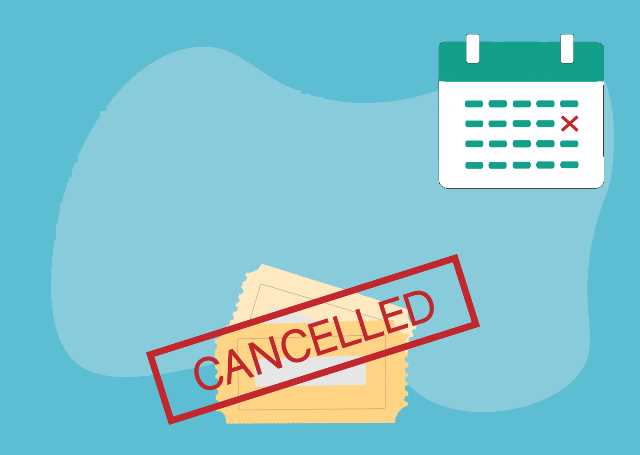The coronavirus pandemic has affected virtually every event scheduled after Q1 of 2020, and has forced many to cancel. But with alternative formats and rising competition, is cancelling outright ever the best decision? Here's our take.
Event organizers have been under an incredible amount of stress and pressure over the last few months — many having to make challenging and complex decisions to determine the outcomes of their events in the wake of Covid-19.
Some have postponed in the hopes that conditions would improve later in the year, but many of those events are being postponed further or canceled as we approach the fourth quarter with less optimism than we had earlier in the year. Others have tried to pivot their events to virtual (although only 40% have succeeded thus far). About as many have decided to cancel their events outright, with no plans to reschedule or move online until 2021.
Cancellation has generally been seen as a last resort, but it's still an option being considered by many event organizers. There are costs to doing so beyond the obvious lost deposits and cancellation fees. The economy is on uncertain footing and the competitive landscape for event content is becoming harder to navigate.
With this in mind, it's important to weigh whether cancellation is truly the best course of action. Here are some important considerations to factor into any cancellation decision.
Keeping Attendees Engaged Is Essential
Cancelling an event means losing out on a significant engagement and revenue generating opportunity, and chances to recover losses may be few and far between for the foreseeable future. Meanwhile, virtual events have removed many of the normal barriers for entry into the events market, and attendees can now attend high-profile events from anywhere in the world. Meanwhile, there are more and more online experiences competing for their attention, as will a growing supply of longer-term/subscription-based online content.
Keeping attendees engaged is key to weathering the ongoing storm — it's crucial not to lose any interest you may have generated in your event and/or brand.
The best way to keep people engaged short of a live event — if done right — is a virtual experience. If that's simply not in the cards, it's important to make sure they don't lose interest and move on by the time your next event rolls around. This could mean creating an online forum or community to prompt discussions and connections with attendees, or providing other content tidbits that they can engage with in the meantime.
For example, the E3 video game convention, which was supposed to take place in Los Angeles in June, was officially cancelled back in March. However, they have been posting updates and links to virtual experiences from individual game developers on their website for their audience to take part in. This is a useful strategy to keep people engaged with their brand, coming to their site as a resource for industry updates.
In sum, announcing a cancellation without a clear plan to continue interacting and engaging with audiences until you can meet again — whether that's in person or online — is not advised.
Virtual Competency Is Increasing
Many virtual events have remained free for the time being as many organizations try them out for the first time, but if virtual continues to become more viable as an alternative that is able to deliver value to attendees, selling tickets or subscriptions will inevitably become the norm.
Virtual will also play an important role even when live events return and hybrid formats become more widespread. Planners who have already successfully implemented virtual events and engaged an online audience will be at an advantage.
Cancelling an upcoming event not only means risking it being replaced by others that have decided to forge on this year, but also potentially losing out on future returns by not mastering virtual now.
Insurance Coverage May Be Unforgiving
Insurance coverage is one of the first things planners looked to when the pandemic hit. While some were able to invoke the force majeure clauses in their contracts, many others — including GSMA, which puts on Mobile World Congress — faced massive cancellation fees.
Insurance is clearly one of the main factors to consider when assessing the financial impact of cancelling an event. If your event insurance fully covers cancellation fees due to the coronavirus, cancelling may make sense (although continuing to engage attendees is still important, especially for smaller or less popular events).
If the more likely scenario applies, and cancellation will not be covered by insurance, it's probably best to turn to one of the other two options. Partners and sponsors may be flexible if you decide to push your event date, or you may be better off transitioning to virtual to mitigate your losses.
In the case of MWC, although the event's stakeholders took a major financial hit, an event of this size and importance is likely going to be able to recover. Nevertheless, had virtual events been a more established solution when MWC cancelled, they probably could have recouped some losses by attempting a virtual pivot — especially considering a grassroots event popped up in Barcelona almost immediately after to serve the captive audience.
Long-Running Events Will Have an Easier Comeback
Some events have a strong record of delivering successful events that can reassure sponsors, as well as an interested audience that will likely still attend the next show if this year’s is canceled. For example, an auto show like SEMA would be incredibly challenging to translate to a virtual format, and since it has been taking place for decades, organizers weren't taking on an insurmountable risk by cancelling this year's event.
On the other hand, newer events that don't have a strong history behind them may find it harder to make the case for their event if and when it does return. It's especially important for such events to find a way to preserve their ROI so that they don't lose steam or their potential for a comeback.
The Timeline for Recovery Is Uncertain
Even if you run a large and long-standing event, cancelling under the assumption that it will come back with a bang next year may be unwise just because of the changing economic environment. While things are looking somewhat promising for the development of a coronavirus vaccine, its effectiveness has yet to be confirmed, and the timeline for its rollout is still up in the air. It's almost inevitable that the virus will remain a concern going into next year, especially in places in the US where it's still running rampant.
In addition to the safety aspect of resuming events, there is also the economic impact of the pandemic to consider. If organizers take too much of a hit this year, they may not necessarily be in a position to resume next year, and attendees — many of whom have lost their jobs since the beginning of the year — may not be able to justify the ticket and travel costs associated with attending an event.
In the example of E3, mentioned above, they likely don't have anything to worry about in terms of resuming next year, which makes their decision to cancel more reasonable. Video game sales have skyrocketed since the beginning of the pandemic, so people will likely be eager to return to these events next year, even after having taken a year off.
However, not all events can count on going back to such a healthy industry.
IN CONCLUSION
The current pandemic has put the events industry through the wringer, and although some small events are starting to resume, there will still be many tough decisions ahead.
Cancellation may still be inevitable for certain events, but it should definitely be a last resort, and should always be accompanied by an effort to engage audiences in some way online until there is a clear path to recovery.




.png)
.jpg)

